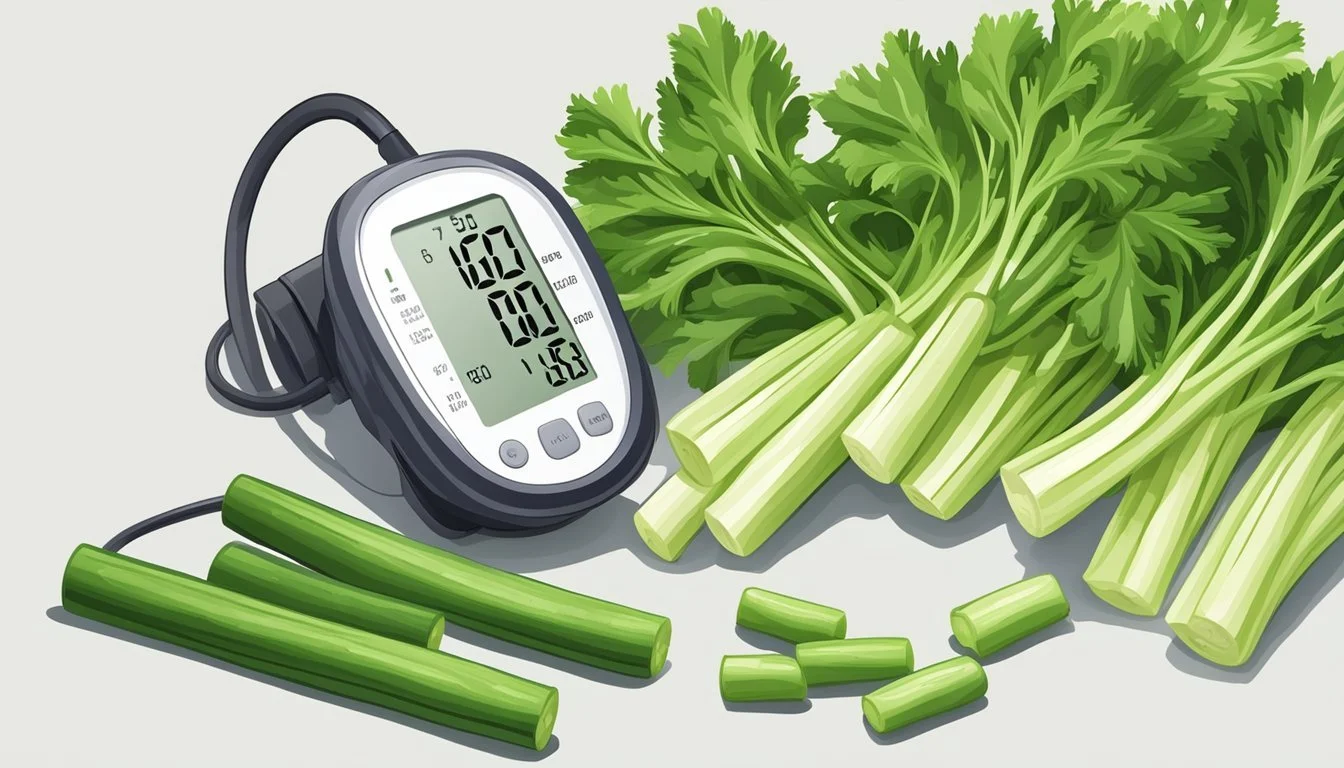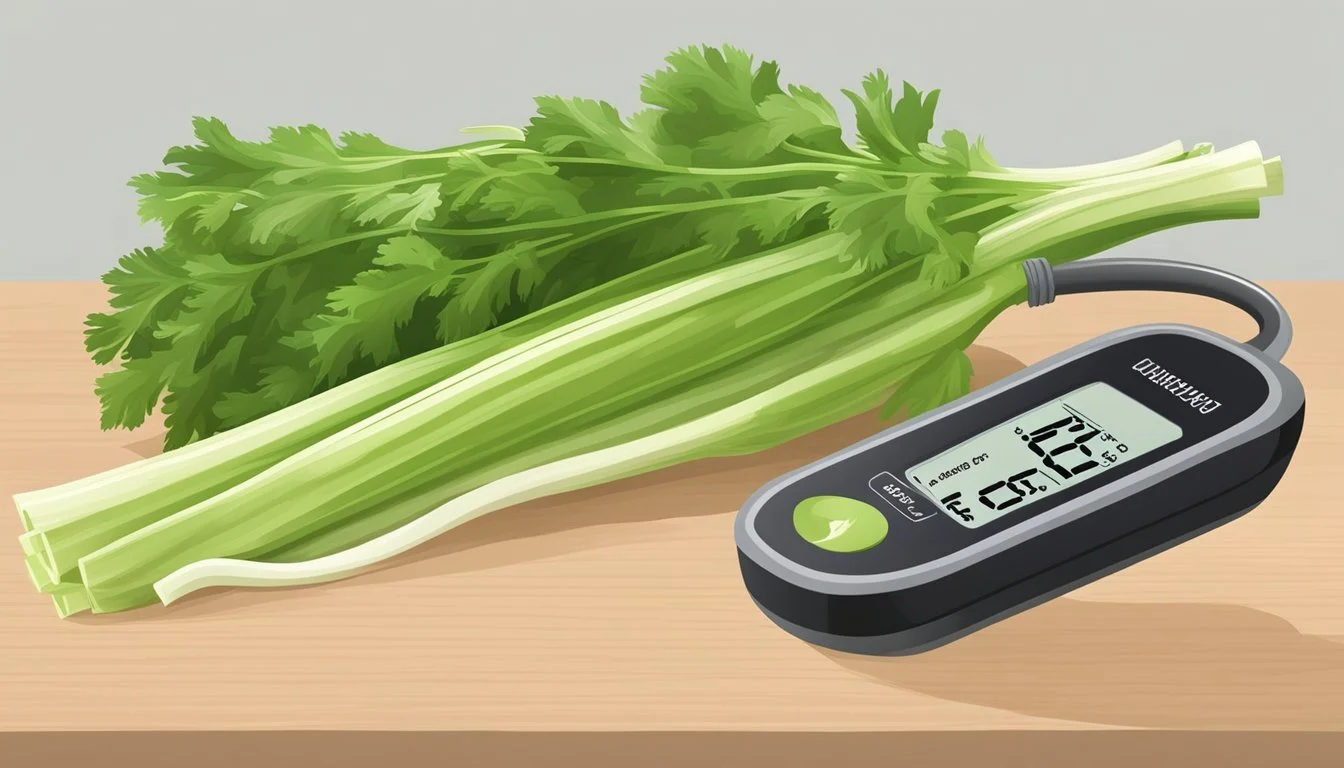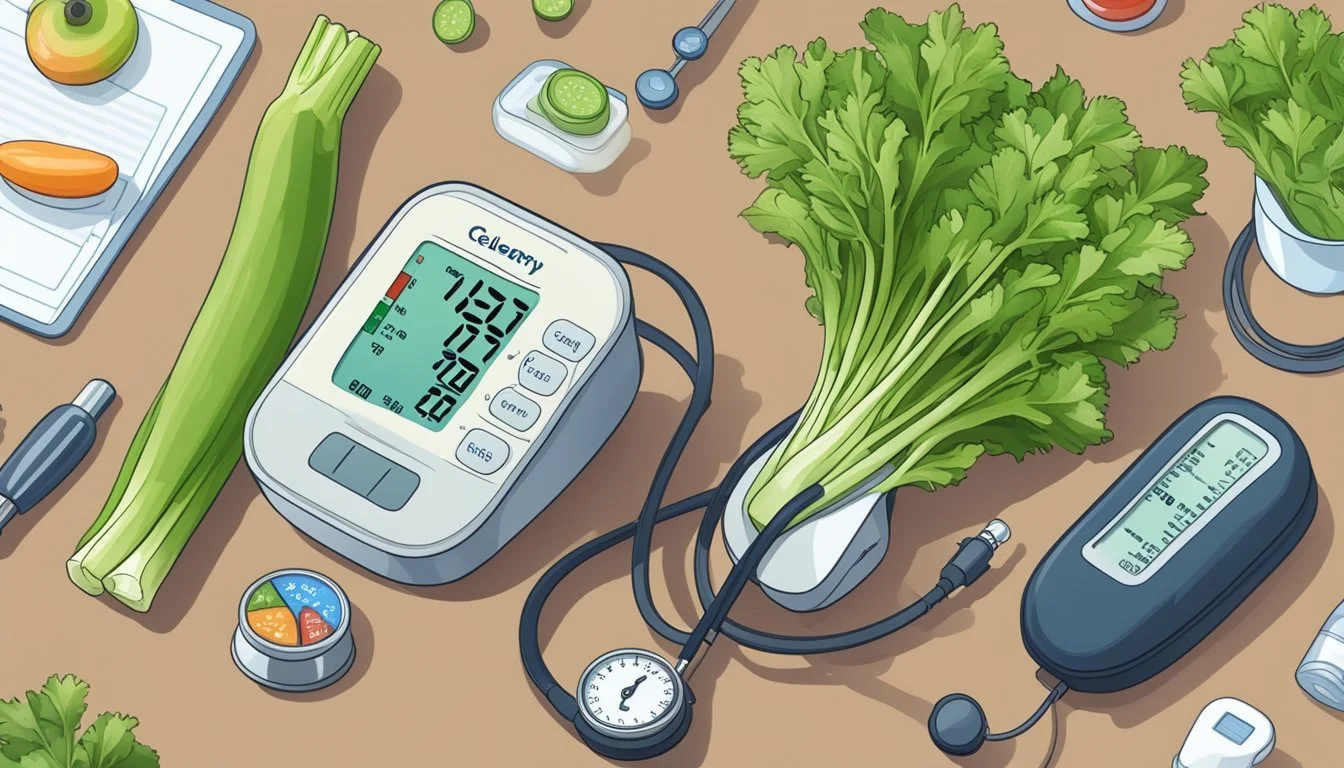Can Eating Celery Help Lower Blood Pressure?
Unpacking the Science and Benefits
High blood pressure is a common health concern that affects millions worldwide. It's a condition that can lead to serious cardiovascular problems if not managed effectively. Among various dietary and lifestyle interventions to control blood pressure, the role of certain foods has been explored in scientific studies. Celery, a crunchy vegetable often regarded for its low-calorie content, has shown potential in the realms of blood pressure management.
The active compound in celery, known as phthalides, has been identified to contribute to the lowering of high blood pressure. Phthalides help relax the muscles in and around arterial walls, creating more space and allowing blood to flow with less pressure. Additionally, celery contains apigenin, an antioxidant which is thought to help reduce blood pressure by dilating blood vessels and promoting better circulation.
While the benefits of celery in reducing blood pressure are supported by certain studies, it's important to recognize that it's not a stand-alone solution. Consuming celery as part of a balanced diet, rich in fruits, vegetables, whole grains, and low-fat dairy, is a more comprehensive strategy when aiming to lower blood pressure. Consistent dietary patterns, such as the DASH diet, alongside regular physical activity, remain the cornerstone of effective blood pressure control.
Understanding Blood Pressure
Hypertension is a common condition affecting millions globally, baring intricate connections with one's diet and lifestyle. Maintaining proper levels of sodium and potassium and embracing healthy lifestyle changes are key actions that can offer significant health benefits.
Defining Hypertension
Hypertension, more widely known as high blood pressure, occurs when the force against the artery walls is too high. A blood pressure reading consists of two numbers: the systolic pressure over the diastolic pressure. The general threshold for hypertension is a reading above 130/80 mmHg.
The Role of Sodium and Potassium
Sodium plays a pivotal role in hypertension as it can increase the fluid volume in the bloodstream, leading to elevated blood pressure. Potassium, conversely, helps to relax the blood vessel walls and excrete sodium, balancing the effects of high sodium intake. An apt proportion of these minerals is crucial for blood pressure regulation.
Sodium:
Daily recommended intake: Less than 2,300 mg
High-sodium foods: Processed and canned foods
Potassium:
Daily recommended intake: 2,600 to 3,400 mg for adults
High-potassium foods: Bananas, leafy greens, potatoes
Impact of Lifestyle on Blood Pressure
Lifestyle choices directly influence blood pressure levels. Regular physical activity, moderation in alcohol consumption, nonsmoking, and a balanced diet rich in fruits, vegetables, and low-fat dairy are practices known to promote a healthy blood pressure. Stress management is another essential aspect, as chronic stress may contribute to sustained hypertension.
Nutritional Profile of Celery
Celery is a vegetable known for its crisp texture and distinct flavor, often recognized for its low-calorie content and high water ratio. Its nutritional composition includes a variety of vitamins, minerals, and fiber, all of which contribute to its health benefits.
Celery and Its Nutrient Content
Celery is a rich source of various nutrients that are essential for maintaining good health. Specifically, it contains:
Vitamins: A notable concentration of vitamin K is present in celery, which is vital for blood coagulation and bone health. Other vitamins include vitamin A, which promotes vision and immune function, and vitamin C, which is important for skin health and immune defense.
Minerals: Celery provides necessary minerals such as calcium, important for bone health; magnesium, which plays a role in many biochemical reactions in the body; and potassium, which is crucial for maintaining fluid balance and normal heart and muscle function.
Here's a breakdown of the nutrient content in a typical serving of celery (1 cup, chopped, approximately 100g):
Nutrient Amount Calories 16 kcal Fiber 1.6 g Calcium 40 mg Magnesium 11 mg Potassium 260 mg Vitamin A 449 IU Vitamin C 3.1 mg Vitamin K 29.6 mcg
Fiber and Its Effects on Health
Celery's fiber content deserves particular attention. An average-sized stalk contains about 1 gram of fiber, which aids in digestion and has been associated with a variety of health benefits. Fiber helps to:
Maintain digestive health: By normalizing bowel movements and potentially lowering the risk of developing hemorrhoids.
Control blood sugar levels: By slowing the absorption of sugar, aiding in the management of diabetes.
Support heart health: Through its capability to lower cholesterol levels and reduce blood pressure.
The fiber in celery, although modest in quantity, can cumulatively contribute to the recommended daily intake, especially when included as part of a diet rich in fruits, vegetables, and whole grains.
Celery's Impact on Cardiovascular Health
Celery is a vegetable often recognized for its crunchy texture and low-calorie content, but its contributions to cardiovascular health may extend far beyond its staple status in diets. This section examines how the phytochemicals in celery, including phthalide, apigenin, and flavonoids, interact with blood pressure, cholesterol levels, and heart health.
Celery and Blood Pressure Regulation
Celery contains phthalides, which are organic chemical compounds that have been shown to relax the tissues of artery walls. This relaxation can result in increased blood flow and potentially lower blood pressure levels. Specifically, these compounds may dilate the blood vessels, allowing for easier blood flow, thereby assisting in blood pressure regulation.
Cholesterol Levels and Heart Disease
Regular consumption of celery may also have a favorable influence on cholesterol levels. The fiber content in celery can bind to cholesterol particles and aid in their excretion from the body. Maintaining lower cholesterol levels is crucial because high levels are associated with an increased risk of heart disease.
Antioxidants and Heart Health
Celery is rich in antioxidants, including the flavonoid apigenin, which is noted for its anti-inflammatory properties. Antioxidants are essential as they combat oxidative stress and inflammation, factors that are closely linked to heart disease and heart failure. A diet high in antioxidant-rich foods like celery may help reduce the risk of cardiovascular disease.
Potential of Celery in Hypertension Management
Celery, a common culinary vegetable, may have surprising health benefits particularly in the context of managing high blood pressure, also known as hypertension. Compounds found in celery such as phthalides and apigenin have been linked with promoting smoother blood flow and reducing inflammation, potentially making it a noteworthy supplement in hypertension management.
Celery Seeds as Hypertensive Supplement
Celery seeds have garnered attention for their potential use as a hypertensive supplement. These seeds are a concentrated source of various substances known to support cardiovascular health, and incorporating them into one's diet could be beneficial for managing high blood pressure. Moreover, they may help in reducing stress on the circulatory system by facilitating vasodilation, thus improving overall blood flow.
Apigenin and Blood Vessel Relaxation
Apigenin, an active compound found in celery, plays a significant role in the relaxation of blood vessels. This substance can help reduce hypertension by causing vasodilation, which enables blood to flow more freely through the circulatory system. Regular consumption of celery, which contains this compound, may assist in maintaining healthy blood pressure levels.
Phthalides and Smoother Blood Flow
Celery is also rich in a phytochemical known as phthalide. Phthalides have been shown to help lower blood pressure by relaxing the tissues of the artery walls. This relaxation effect can lead to smoother blood flow and lower stress on the cardiovascular system, making celery a natural ally in managing high blood pressure.
Celery Seed Extract and Other Derivatives
Celery seed extract has been recognized for its potential in lowering blood pressure due to its vasodilatory effects. Derived from celery seeds, this extract and other celery-based products have gained attention for their health benefits.
Benefits and Uses of Celery Juice
Celery juice, made by liquefying the stalks of celery, is consumed by many for its health-promoting properties. The juice is a source of antioxidants and flavonoids, such as apigenin, which may reduce stress and inflammation—factors associated with hypertension. Moreover, it acts as a vasodilator, widening blood vessels, which can help facilitate lower blood pressure.
Celery Supplements: Pros and Cons
Pros:
Antioxidant-rich: Supplements made from celery seed extract contain antioxidants that assist in reducing oxidative stress and inflammation.
Vasodilator effect: These supplements may mimic certain blood pressure medications by relaxing blood vessels, contributing to blood pressure reduction.
Cons:
Potential interactions: Celery supplements could interact with blood pressure and diabetes medications, necessitating caution.
Varying potency: The concentration of active compounds like flavonoids can vary, affecting the supplement's effectiveness.
Complementary Foods and Diet for Blood Pressure
Managing blood pressure involves a holistic approach to diet, with a focus on nutrient-dense foods that can work together to support vascular health.
Role of Vegetables and Fruits
Vegetables and fruits are cornerstones in a blood pressure-friendly diet due to their high content of potassium and magnesium—minerals essential for vascular health. Leafy greens such as spinach and swiss chard, along with beetroot, are valuable for their nitrate content which can aid in blood vessel dilation. Fruits like citrus and bananas are potent in potassium, assisting in the excretion of sodium and reduction of pressure on blood vessel walls.
Vegetables: Spinach, Swiss chard, Beets, Celery
Fruits: Oranges, Lemons, Bananas
Healthy Fats and Proteins
Monounsaturated and omega-3 fatty acids have a beneficial effect on heart health. Olive oil, nuts such as walnuts, seeds including chia seeds and flaxseed, and cold-water fish are key sources of these heart-healthy fats. They can assist in lowering blood pressure by reducing inflammation and improving blood vessel function.
Healthy Fats: Olive oil, Chia seeds, Flaxseed
Proteins: Fish (especially wild-caught cold-water varieties)
Whole Grains and Fiber-Rich Foods
A diet high in whole grains and fiber can improve blood pressure by aiding in weight management and enhancing digestive health. Fiber-rich beans and pulses are also integral to vegetarian and DASH diet patterns, which have been shown to be beneficial in managing hypertension.
Whole Grains: Oats, Brown rice, Quinoa
Fiber-Rich Foods: Beans, Lentils
Lifestyle and Dietary Adjustments
Managing blood pressure involves comprehensive lifestyle and dietary adjustments. These changes can significantly impact an individual's health and mitigate the risk factors associated with high blood pressure.
Weight Management Tips
Maintaining a healthy weight is crucial in lowering blood pressure. For overweight individuals, losing even a small amount of weight can help reduce their numbers. Here are some weight management tips:
Monitor Caloric Intake: Keep track of calories and try to consume a balanced diet that supports gradual weight loss.
Portion Control: Eat smaller portions and refrain from second helpings to help maintain a calorie deficit.
Incorporating Routine Exercise
Regular physical activity strengthens the heart, enabling it to pump blood with less effort, thereby reducing the pressure on the arteries. Exercise recommendations include:
Aerobic Activities: Aim for at least 150 minutes of moderate-intensity aerobic exercise each week, such as brisk walking, swimming, or cycling.
Strength Training: Incorporate moderate strength training exercises at least two days a week.
Stress Reduction Techniques
Chronic stress contributes to high blood pressure. Reducing stress is an important aspect of managing blood pressure:
Relaxation Practices: Activities such as yoga, meditation, and deep breathing can help reduce stress levels.
Consistent Sleep: Ensure adequate sleep, as lack of it can exacerbate stress and indirectly increase blood pressure.
Dietary Choices for Lower Blood Pressure
The right diet is instrumental in lowering and managing blood pressure. Key dietary choices include:
Potassium-Rich Foods: Include bananas and beets, which can help lessen the effects of sodium on blood pressure.
Celery: Contains phthalides that may relax artery wall tissues, thereby potentially reducing blood pressure; however, its sodium content should be considered in overall dietary sodium intake.
Limited Sodium: Reduce salt intake by avoiding processed and fast foods and by seasoning with herbs.
Follow the DASH Diet: The Dietary Approaches to Stop Hypertension (DASH) diet emphasizes fruits, vegetables, whole grains, and low-fat dairy foods and limits saturated fat and cholesterol.
Potential Risks and Precautions
While celery is often touted for its health benefits, particularly for its potential to lower blood pressure, one must consider risks and precautions to avoid adverse effects.
Understanding Harm from Excessive Intake
Consuming celery in moderation is generally considered safe for most individuals. However, excessive intake of celery can lead to a variety of health issues. Due to celery's natural sodium content, overconsumption may counteract its blood pressure-lowering benefits, posing risks to those on sodium-restricted diets. Moreover, an overabundance of celery might lead to imbalanced nutrient intake and potential gastrointestinal discomfort.
Interactions with Medications
Celery may interfere with certain medications, particularly blood pressure medications and diuretics. Due to its blood pressure-lowering properties, consuming celery alongside these medications could result in blood pressure dropping too low. It is imperative for individuals taking medications to consult with healthcare providers prior to including celery in their diet as a natural remedy.
Antihypertensives: Risk of enhanced blood pressure-lowering effect.
Diuretics: Potential for electrolyte imbalance due to increased diuresis.
Allergic Reactions and Sensitivity
Like many foods, celery can cause allergic reactions in some individuals. Allergic reactions can range from mild to severe, with symptoms such as itching, swelling, and in extreme cases, anaphylaxis, a life-threatening condition that requires immediate medical attention. Individuals with known allergies to celery should avoid it, and those who experience allergic symptoms after consuming celery should seek medical advice.
Mild reactions: Include oral itching and gastrointestinal discomfort.
Severe reactions: Possibility of anaphylaxis, warranting urgent medical treatment.
Scientific Research and Evidence
Extensive research has been conducted to explore the relationship between celery consumption and blood pressure regulation. The focus has primarily been on the plant's unique compounds and their possible effects on the cardiovascular system.
Studies on Celery and Blood Pressure
Researchers have noted that celery contains phthalides, which may relax the muscle tissue in artery walls, enhancing blood flow and consequently reducing blood pressure. One case study observed a hypertensive elderly male who consumed roughly 12 stalks of celery daily, delivering approximately 2000 mg of potassium. Over a three-month timeframe, the patient’s blood pressure remained stable. Another study suggests that consuming four celery stalks per day could potentially reduce blood pressure by up to twelve percent. These findings indicate a possible positive effect of celery on blood pressure, but they also call for larger-scale studies to confirm these results.
Analysis of Celery's Medicinal Properties
Celery is rich in various plant compounds, including apigenin and luteolin, that exhibit antioxidant properties. These phytonutrients might contribute to the observed antihypertensive effects by reducing oxidative stress and improving vascular function. The overall antioxidant activity of celery presents a compelling case for its role in blood pressure management. However, it’s worth noting that celery also contains sodium, a mineral that is often advised to be consumed in moderation for those with high blood pressure. This underscores the importance of balance and further scientific scrutiny to fully understand celery's medicinal potential.
Conclusion
Celery, enriched with important nutrients like potassium and a phytochemical known as phthalides, has been associated with cardiovascular health benefits. Potassium is an essential mineral that helps modulate fluid balance and heart function, attributes essential for managing high blood pressure.
Studies suggest that the phthalides in celery can relax the tissues in the artery walls, enhancing blood flow and potentially lowering blood pressure. Regular consumption of celery or its extract might, therefore, offer a natural way to support cardiovascular health.
However, consumers should be aware that celery also contains sodium. Excessive sodium can counteract its beneficial effects by promoting fluid retention and increasing blood pressure. Individuals considering celery as a dietary strategy for blood pressure management should balance their intake and consider the following points:
Aim for a well-rounded diet emphasizing diversity rather than relying on a single food.
Remember that moderation is key; celery should be part of a broader approach towards a healthy lifestyle.
It's advisable to consult with healthcare professionals before making significant changes to one's diet, especially for those with existing health conditions or those on medication.
Incorporating celery into daily diets can be a part of an overall plan to maintain healthy blood pressure levels. It should be coupled with other lifestyle choices, such as regular exercise, stress management, and the reduction of high-sodium foods.




